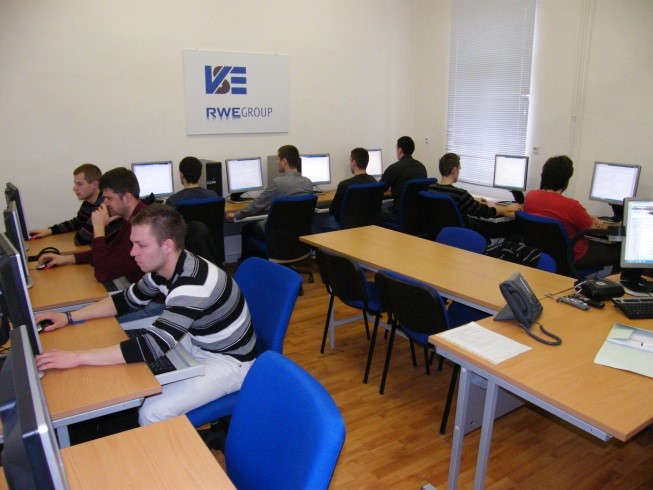Head of laboratory: doc. Ing. Jaroslav Petráš, PhD.
The laboratory is used for teaching and research purposes. Laboratory exercises and consultations for bachelor’s and engineering students at the Department of Electrical Power Engineering take place here. The teaching equipment is mainly focused on automated wiring technology and systems such as the KNX / EIB system, the use of database systems in the field of power engineering, diagnostic methods in the field of high voltage insulation systems and other areas of power engineering in which computing is required. The laboratory is equipped with 12 student client stations and one teacher’s computer station. The laboratory is supplemented by a modern interactive presentation technique in the form of an interactive touch panel enabling face-to-face teaching as well as a remote form of presentation and teaching and a wide-angle projector with a scanning camera for scanning printed materials.
Subjects and outputs of education:
- Bachelor study: Subject Basics of electrical engineering (Basic knowledge and skills in the field of DC circuit design, creation of technical documentation)
- Bachelor study: Subject Non-traditional energy sources (Familiarization of students with PV-SOL software for photovoltaic systems design, which is used for optimal design and deployment of photovoltaic systems, assessment of solar radiation through DIalux program for determining lighting conditions for photovoltaic systems),
- Engineering study: Subject Automated electrical installation systems (Basic knowledge and skills in the field of design and programming of automated electrical installation systems),
- Engineering study: Subject Database Systems – SQL Oracle (Basic knowledge and skills in the design of relational database systems with a focus on use in the field of power engineering),
- Engineering study: Subject Electromagnetic compatibility (basic knowledge and knowledge in the field of EMC technical equipment and biological systems, origin and propagation of electromagnetic interference, elimination of interference on electronic equipment, effects of impulse phenomena in low voltage networks on electronic equipment, principles of PCB design with respect to electromagnetic immunity, shielding and grounding methods for electronic devices).
- Engineering study: Subject Overvoltages in electrical networks (gaining knowledge about the occurrence of surges in electrical networks for different operating conditions, using the correct terminology and symbology, gaining professional skills in using PC technology and software to solve surges arising in operation using the simulation program EMTP ATP)
- Engineering study: Subject Quality and reliability of electricity supply (basic knowledge of electricity quality indicators, based on problem-oriented examples gaining knowledge about the origin and consequences of deteriorating electricity quality and the possibilities of its improvement) The student will also gain knowledge in the field of electricity supply reliability, methods its calculation and the methods of its evaluation.
- Engineering study: Subject Power transmission stability (Expanding knowledge in the field of calculation, analysis and interpretation of results from power transmission stability. Competences in the use of the Matlab software tool for system stability calculations.)
- Engineering study: Subject Automated electrical installation systems (Basic knowledge and skills in the field of programming automated electrical installation systems. Competences in the use of software tools ETS (Engineering Tool Software) and iDM3 (iNELS3 Designer & Manager))
The installed software meets the requirements of the teaching areas and is updated annually with new versions of applications and in accordance with the current requirements for the subjects taught. Each of the workstations installed professional and full versions of applications for setting up automated wiring systems (INELS, KNX / EIB – ETS application), database and web server, Matlab and Scilab computing applications design systems ProgeCAD, gEDA, Dialux and PV-SOL, simulation EMTP programs ATP, Matlab, Octave, FEMM, applications for diagnostics of high-voltage insulation systems of power equipment using recovered voltages, applications for simulations in the field of lighting technology and others.

